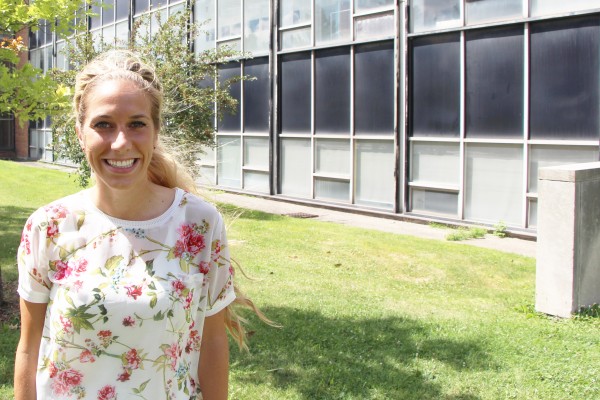 Human Kinetics Masters Candidate Sara Santarossa thesis’s survey focused on how four social media sites - Facebook, Instagram, Twitter and Pinterest - strongly affected eating behaviours, eating disorders, body image and self-esteem.
Human Kinetics Masters Candidate Sara Santarossa thesis’s survey focused on how four social media sites - Facebook, Instagram, Twitter and Pinterest - strongly affected eating behaviours, eating disorders, body image and self-esteem.
Young men and women who are addicted to using social networking sites, may suffer from a negative self-image and have a predisposition to such dangerous eating habits as binge eating and missing meals, says Human Kinetics Masters Candidate Sara Santarossa (BHK ’13).
“It all boils down to the dangers of social comparison and the huge role that it plays in how we socially construct our self-esteem and our body image,” says Santarossa. “When society’s ideals seem like one-point-of-view, from the media, our peers and our family, it is that much more powerful.”
In her thesis, #Socialmedia: Exploring the Associations of Social Networking Sites and Body Image, Self-Esteem, Disordered Eating and/or Eating Disorders and the Impact of a Media Literacy Intervention, Santarossa says that on average, women were spending four hours a day on social media sites, and men were spending three hours. She referred to those spending at least five hours a day, as problematic social networking site users.
In a survey that measured addictive behaviours towards social media, Santarossa and her supervisor, Human Kinetics professor Sarah Woodruff, asked of 160 male and female first-year UWindsor students about social media usage and personal habits and behaviours. The survey focused on how four social media sites - Facebook, Instagram, Twitter and Pinterest - strongly affected eating behaviours, eating disorders, body image and self-esteem.
Men and women who used social media sites for hours a day, says Santarossa, often had higher internalized beauty standards and low self-esteem. She says the women tended to see thin as beautiful, and men considered being muscular and toned as the ideal.
Other findings include women favouring Instagram, the mobile photo sharing site, because they prefer looking at other people’s photos and the more time they spent on the site, the higher chance they were skipping meals and binge eating. Men favoured posting on other people’s profiles, and also had a greater chance of having eating disorders if they spent at many hours a day on sites.
Santarossa was inspired to study this topic after a 10-year-old family friend created a Facebook post asking people to comment on whether or not they considered him to be ugly. She says she was further disturbed, during her preliminary research into networking sites, to see the number of codependent groups forming around eating disorders.
“When you’re social networking you are constantly comparing yourself to pictures of others and other people’s posts,” says Santarossa. “These photos may also have been filtered or altered in some way, so you are not even comparing yourself to reality.”
Santarossa says there needs to be a stronger emphasis on health at any size. For part of her study she teamed up with the Bulimia and Anorexia Nervosa Association (BANA), a centre for eating disorders, health and wellness, to host a media literacy intervention.
Half the survey group attended a BANA lecture where they discussed media-related beliefs and attitudes, and viewed overly-sexualized advertising campaigns and images of the children’s cartoon character Dora the Explorer, who recently went through a makeover where she ditched the sneakers, backpack and baby fat, for makeup, long hair and a taller, thinner frame.
The other half of the survey group attended an unrelated career talk. One month later, Santarossa re-surveyed the entire group and found that those who attended the BANA lecture displayed lower eating disorder symptoms compared to the control group. She says education and positive messaging works.
“When you train young adults to critically analyze the media and online images, they can become conscious consumers of what the web has to offer and they can critique what the advertising and media industries are throwing at them,” says Santarossa.
Santarossa defended a masters thesis this summer and will return to UWindsor to start a PhD with Dr. Woodruff.
“With my PhD I’d like to create media literacy educational tools that could help parents, and possibly teachers, to educate children on how to leave a positive digital footprint, to use social media sites in an informed way,” says Santarossa.

